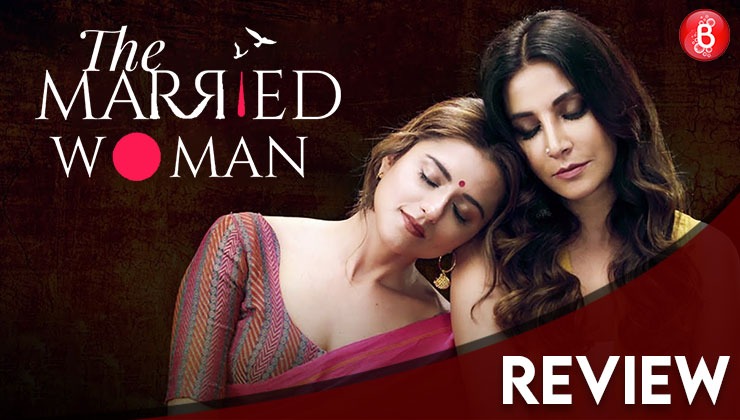
Directed By Sahir Raza
Cast: Ridhi Dogra, Monica Dogra
Streaming on Zee5, Alt Balaji
Bollywood Bubble Rating
![]()
In The Married Woman, there are two parallel worlds showed, one which is deep-rooted in bigotry, another is the world you seek and imagine for a modern India. Ekta Kapoor’s The Married Woman starring Ridhi Dogra [Astha] and Monica Dogra [Peeplika] is set in 1992, amid the ongoing tension post the Babri Masjid demolition. Ever as religious sentiments were on a rampage, parallelly two women found solace in each other and discovered themselves in the process. While secularism was dying a slow death on one side, love blossomed on another. Which idea of India perhaps resonates with you?
The Married Woman has been directed by Sahir Raza. The series is adapted from Manju Kapur’s A Married Woman. The Married Woman walks on a thin line balancing the threads of modernity at the surface without digging too much into the conditioning and taboo which follows. The subject is dealt with sensitivity but at times, to play safe, a lot of questions remain unanswered. Sahir has tried to ruffle a few feathers here and there with his low-key approach to the romance between the two women, but not enough to let us into the world of Astha and Peeplika, as much as we would like to.
The Married Woman is Astha’s story, a story of a married woman who by example seems to be content and happy in her life, but look closer, and you will start seeing the dents. Facing an identity crisis after being married to Hemant [Suhash Ahuja] for 11 years, Astha finds distraction in Aijaz (Imaad Shah), who sells an idea of a freer world to her, where love triumphs the self-imposed boundaries, the religious divide. However, grim circumstances bring Aijaz’s wife Peeplika and Astha closer where they fall in love.
View this post on Instagram
The passion between the two women falling in love is explored with caution in The Married Woman, and the audience is left with a cliffhanger climax. The show sells the idea of conditioning Vs individuality but refuses to be boxed as a lesbian love story. Time and again, we are told that love is about connecting to the soul and not the gender.
What works for the show?
Despite handled with kid gloves, the show dares to touch upon a subject hardly explored. Full marks to Ridhi Dogra and Monica Dogra for pulling off Astha and Peeplika rather impactful. The soul of the show is in the right place. Even as I think Peeplika’s character was much more defined than Astha’s, the actors put in their skills to best use and kept us invested in their love story. Ridhi is terrific in her parts even as her character lacked a certain depth. Monica as the boho-chic-clad free-spirited woman is on point, even as the portrayal of a modern woman continues to remain stereotyped. But it all works.
Astha’s commentary from time to time gave us a closer look into her world and was a clever move, however, in the first episode, I found that overtly used. Ayesha Raza, despite her short screen presence, is impactful as the bickering sister-in-law who suspects the relationship between Peeplika and Astha.
Suhash Ahuja plays his part well as the clueless husband or as Peeplika calls him (toilet seat) who is naturally condescending towards his wife and is ignorant of her feelings.
The music, the attempt at staying true to the era is palpable as well.
View this post on Instagram
What could have been better?
The time taken for Astha and Peeplika’s love story to bloom was shockingly short, leaving us with a big question mark. The first two episodes of The Married Woman were slow and stretched as were many scenes in between. While a lot of attention was given to Peeplika’s background and story, what I couldn’t understand was Astha’s sudden love for Peeplika. Yes, we know she wanted to be seen and not just for her body but herself, as Astha but that is not reason enough for her to fall in love with Peeplika instantly, right after she confesses to Aijaz. Her feelings and confusion should have been better explored.
An essential problem I had with the story was that very little was done to eradicate the stereotype of Peeplika Vs Astha, the free-spirited modern girl vs the sanskari Nari.
The desire to be radical is earnest but limited. The Married Woman deserves a watch for its honest attempt.
Also Read: EXCLUSIVE: Ridhi Dogra opens up on being cordial with ex Raqesh Bapat, facing judgements
Assistant Editor at Bollywood Bubble. An ambivert who is currently high on K-dramas and K-Pop. A forever Bollywood fan, who continues to gush over solid stories and characters. Hit me up for a fine conversation over chai.
You can also reach me on – https://twitter.com/filmybugB
























